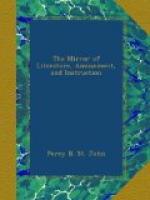We must not bring this paper to a close without explaining that the preceding Engravings have been copied from the first of Mr. Rhodes’s excursions of seventeen miles, viz. from Sheffield to Tideswell. The Abbey and the two Crosses therefore occur in that district. The original plates are effectively engraved by W. and W.B. Cook, from drawings by Mr. Chantrey, R.A., who presented to Mr. Rhodes a series of drawings for his work, “as a token of his friendship, and a mark of his attachment to his native country.”
* * * * *
SELECT BIOGRAPHY
M. CASIMIR PERIER.
(PARTLY FROM THE FRENCH.)
The late French premier, was the son of a rich merchant at Grenoble, where he was born October 12, 1777. At an early age he entered the army: he served in the Italian campaigns of 1799 and 1800, in the staff of the Military Engineers. On the death of his father, however, he quitted the service and devoted himself wholly to commercial pursuits. In 1802, he opened a bank at Paris, and subsequently, establishments for cotton-spinning and sugar-refining, and a steam flour mill, all of which were eminently successful, and contributed to the formation of his immense fortune. He first became known to the public in 1816, by a pamphlet against the foreign loan system, which was equally remarkable for its clearness of argument and profound knowledge of finance. In 1817, he was elected one of the Deputies for the Department of the Seine, and from that time until the revolution of 1830, he continued the firm opponent of every ministerial encroachment on the rights and privileges of the people. He particularly distinguished himself by his hostility to the Villele administration; himself supporting almost singly the whole burden of the opposition to the famous budget of Villele, which he disputed, item by item, with talent and perseverance worthy of entering the lists with the distinguished financier to whom he was opposed. When M. de Polignac became President of the Council, the opposition of M. Perier assumed a more violent character, and he was pre-eminent among the 221 deputies who voted the address which led to the fatal ordonnances of July. When the revolution broke out, he at once avowed himself the advocate of the popular cause,




